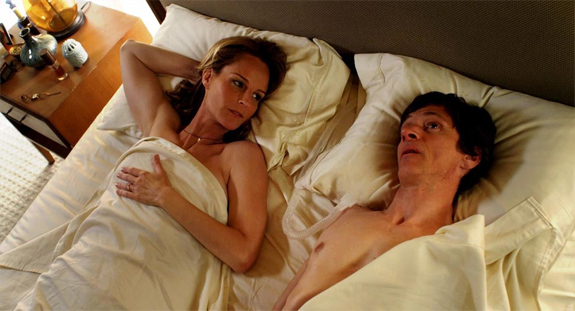5 Questions for the Cast & Crew of the New Film The Sessions
The Sessions is the amazing true story of Mark O’Brien, a man who contracted polio and spent much of his remaining life in an iron lung but managed to graduate college and become a successful author and poet who at the age of 38 decides he wants to lose his virginity. I had a chance to sit down with John Hawkes who does an astonishing job portraying Mark and Oscar-winner Helen Hunt who plays his sexual surrogate as well as producer Judy Levine and director Ben Lewin for a short conversation.
When you are playing a character like Mark O’Brien with such severe limitations due to their physical disabilities and you are in character for a long time, what do you walk away with when you’re free of those limitations?
John Hawkes: A sore back? (laughs) Actually I walk away with much more than that, so I shouldn’t be so facetious. What did I maybe learn from playing Marc? Well, I learned what a terrific poet he is and I was exposed to poetry I wouldn’t have otherwise read.  Marc’s sense of humor maybe kind of lines up with my own on my best day. I’d hope to be as witty as he was on his worst. Gosh, a new attitude perhaps towards disabled people. You know, I was really lucky to be raised during a time, even though I was in a small community in Minnesota that was pretty much blonde haired blue eyed people, teachers taught us in the mid 60’s that people of all colors were the same. I remember in one of our classes listening to Martin Luther King’s speech on record, on LP, but the thing was that the disabled kids were kind of elsewhere and I wish I would have been taught more about that at an early. So maybe what this film has taught me is something that I’ve always striven for in my life, to try to see all people as having worth and not be afraid of people who are different than I am. I think that this movie helps me to maybe try to see everybody a little bit more, see every person that I come across, at some level and just say “I see you†and I respect you on some level.
As an actor, you have been working for a very long time and really you didn’t get big notice right away in your career. I remember seeing you in Miranda July’s movie Me And You And Everyone We Know which is fantastic and then you got nominated for an Oscar last year for Winter’s Bone and I wouldn’t be surprised if you get nominated again for this film. I wanted to know, is it a bigger payoff having worked so hard, the slow road up in a sense?
John Hawkes: I think so. I don’t know if I would have been prepared to handle all this when I was much younger and starting out but it’s a payoff in a sense. I don’t want to seem ungrateful, I’m happy to be here talking to you because I want people to see this movie and this helps. I thank you for that but along with notoriety and visibility comes some things that aren’t so pleasant partly on a personal level but much more on a career level. To be an unknown is a great advantage because people have no expectation of you, then they start to learn about you and then they start to fold their arms a little bit more as they watch you work. Also, I’m worried about losing my invisibility within groups of people because to be one of the crowd and be able to study human behavior is key to me and if I was somehow the center of attention and people acted differently, that would be detrimental. Beyond that, the more people know about an actor in my opinion and the more they associate things with that actor, the less apt they are to believe them. For example, let’s say someone hadn’t seen Winter’s Bone and say I was on a talk show and they watched that talk show the night before and happened to rent the movie and then say “hey, that’s the dude who was on Jimmy Kimmel†or whatever, they are going to be thinking about all kinds of other things rather than just thinking of this guy Teardrop just having grown out of the ground and being really of that land. So it’s a delicate balance. I’m not ungrateful, I feel very grateful if someone comes up to me on the street and they’ve been moved by something I’ve been part of or they feel like I’ve connected to them somehow, that’s the whole point of this. I realize I wouldn’t have a job if there weren’t people who go to the movies. I don’t mean to seem ungrateful but it is a double edged sword. I feel like if my life stayed the same, even before Winter’s Bone, that’s fine for me, I’m maybe kind of an underachiever by nature (laughs).  I’m not sure, but I’m made a little nervous by the visibility, but maybe it will open more doors and maybe I can somehow manage to have a happy life around it all. I hope so.
How risky did this role of the sex surrogate feel, because it’s not just the nudity, but you’re exposed in another sense in that it’s not necessarily sexy, it’s more clinical. What was it like?
Helen Hunt: Scary and exciting because I thought, you never know how a movie’s going to come out, I didn’t think it would come out as good as it did but I did feel like we were onto something that I have not seen before. There’s something honest that’s trying to happen here, so that’s all good.
I wondered if the real life sexual surrogate had any issue with the film at all because it shows her crossing the line from the professional to the more personal. I don’t know if that’s what actually happened or if it was exaggerated at all?
Ben Lewin: I sent her the script as soon as I finished it, I really wanted her to feel comfortable about it and she made some suggestions, one of which she didn’t want to be seen smoking and she didn’t want to be seen using cuss words with her son, so I respected everything she had to say, in fact she suggested a whole lot of lines of dialogue, some of which I used. Where it comes to the line between sort of professional and personal, that was a hazard of the job and she knew it and there was in fact a point in time where she fell in love with one of her clients and married him, so I didn’t feel it was really misrepresenting the fact to say that this was a serious issue in her job.
You and your husband Ben (Lewin) are so close. Do you ever cross lines between producer and director?
Judy Levine: He treats me as his slave! (laughs) You know, I think the biggest problem is that, and it really doesn’t happen anymore so much, but I first met him because I got a job working as his assistant and I think he just goes back to that role so easily which is the point at which I’m resigning and saying sorry you know, you need an assistant and not a producer so I’ll get you an assistant and find yourself another producer but otherwise not much. I think particularly with this film it has been different in some way, we really have not, you know been at loggerheads because it’s been a phenomenal experience all the way. It’s been one step in front of the other no steps back so not much time to argue. It’s been so busy all the time, it’s actually been great because I think we got a bit closer. The last few years were really a strain. There is a work in Hebrew called ‘beshert’, it means you’re sort of meant for each other and despite my better judgment, we are meant for each other. You know, when things were tough it’s always when people struggle and when marriages can fall apart and we’ve managed to ride that roller coaster.  We had gotten to the point that we were so jaded that we thought it was never going to happen and we were ready to move back to Australia, but once we got the money together and we were actually shooting the film, it’s just been fabulous ever since and seeing this kind of success suddenly, we never really expected it with this film.
The Sessions directed Ben Lewin and starring John Hawkes and Helen Hunt is in theaters nationwide.



